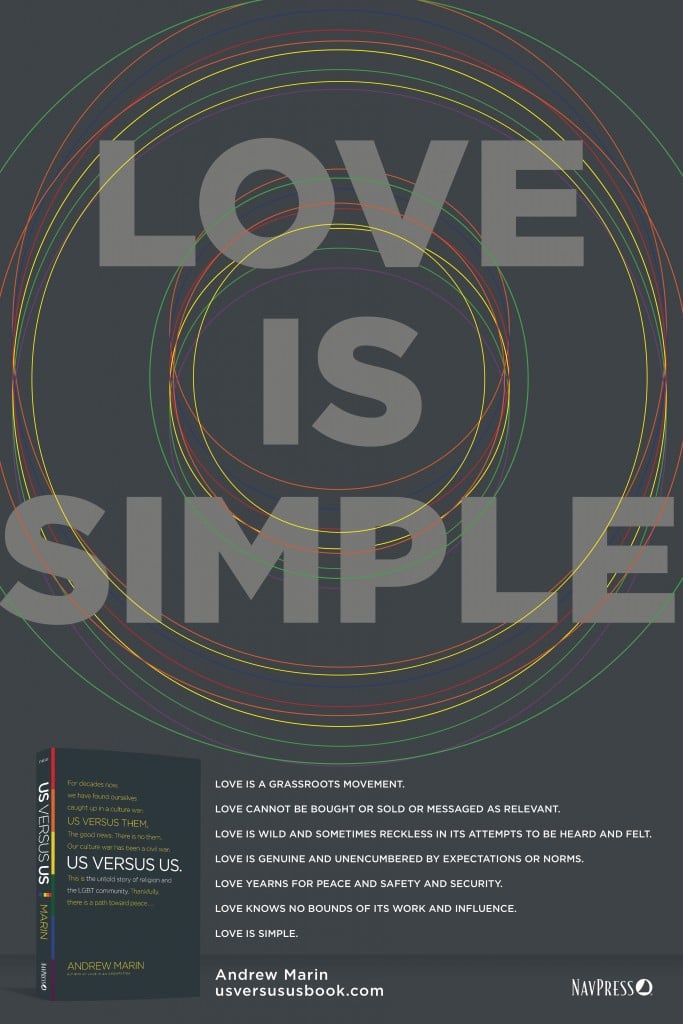 The following post is from Brent Bailey, a Master of Divinity student at Abilene Christian University who will intern this summer with The Marin Foundation. He blogs at www.oddmanout.net. All of our interns raise funds to join us, so if you would be willing to help make it possible for Brent to join us again any donations on his behalf would be greatly appreciated. Donations made here will go towards Brent’s internship when you write Brent’s name into the ‘Tribute Name’ field.
The following post is from Brent Bailey, a Master of Divinity student at Abilene Christian University who will intern this summer with The Marin Foundation. He blogs at www.oddmanout.net. All of our interns raise funds to join us, so if you would be willing to help make it possible for Brent to join us again any donations on his behalf would be greatly appreciated. Donations made here will go towards Brent’s internship when you write Brent’s name into the ‘Tribute Name’ field.
Brace yourselves.
Later this month, the Supreme Court will hear cases related to the Defense of Marriage Act and California’s Proposition 8, which means we’ve got an opportunity for painful and divisive conflict on a large scale coming our way. Public controversies related to the intersection of faith and sexuality come up from time to time, some of them attracting more scrutiny than others and some of them inciting more severe feelings than others. The unavoidable media attention associated with these controversies typically leads to nearly ubiquitous chatter among people from all walks of life, and that chatter often affects listeners much more severely than we anticipate.
A perfect, painful example of this chatter was the uproar surrounding Chick-fil-A last August. I’ll be honest: I’m still not over Chick-fil-A Appreciation Day. The last thing I want to do is reignite arguments about whether waffle fries were born that way or whether it’s okay for two girl chickens to get married on a Sunday; but over the Christmas break, I was coffee-ing with an old friend and suddenly found myself back up on a soapbox preaching about why Chick-fil-A Appreciation Day outraged me so. I was surprised to recognize how upset I still felt months after the August 1 demonstration. What bothered me about the Chick-fil-A controversy, and what continues to bother me about controversies surrounding the Boy Scouts and Obama’s inauguration and other crises, is how quickly the commotion escalated and how thoughtlessly so many of us spoke. Over the course of a few days, Dan Cathy’s interview comments led to a noisy backlash from certain movements, which led to a noisy backlash from other movements, which led to what had to be (pardon my lack of statistics) one of the most numerically successful fast food-related protests in history. And throughout the entire melee, many of us talked. Many of us talked a lot, online and in not-so-private offline conversations, and many of us said and posted things rashly and flippantly for the sake of adding our voices to the conversation.
Did you spend much time browsing social media on August 1 last year? If you’re like me—if the majority of your contacts are either Christian, gay, or both, and if you just couldn’t stop yourself from clicking “Refresh” throughout the day—you probably read many, many comments about Chick-fil-A, gay marriage, and free speech. To be sure, many of them were considerate and meaningful and powerful, effectively communicating compassion and reason in the midst of a tumultuous day. But many of them were also insensitive, imprecise, and childish, stereotyping everyone from Christians to sexual minorities to Republicans to meat eaters, all contributing to an atmosphere of discord. I’d be genuinely surprised if anyone said their views on business ethics or marriage changed on August 1 due to a tweet or Facebook status they skimmed, but I know for a fact that more than a handful of my friends wound up more critical of Christians or more suspicious of the LGBT community based on what they read that day.
I’ve got a theory that the reason these controversies are so explosive is because of how quickly our connectivity allows us to react to things in loud ways. Other than a minority of people who had been steadily raising questions about Chick-fil-A’s charitable donations for a few years, most of us probably felt surprised when Chick-fil-A suddenly became such a big deal. I think the situation is similar with other media frenzies we see: Most of us are surprised when something like the Boy Scouts or Obama’s inauguration gets tied up with ongoing debates about faith and sexuality. When some development catches us off guard, it’s easy for us to hop online and make broad proclamations before we’ve had the time, patience, or motivation to give the matter the thought it deserves. We hear others talking and want to make sure our own perspective gets its fair share of airtime, so we speak up.
What often results, then, are those insensitive, imprecise, and childish comments. Were these comments falling on deaf ears, there would be little reason for concern, and we could carelessly frolic from one headline to the next. Unfortunately, the comments do not fall on deaf ears, and the immense damage that can come from them is often disproportionate to the amount of thought that goes into them. People do read what we write and listen to what we say, and a hasty remark I forget immediately after I make it might permanently cement itself into someone else’s memory. That “someone” could be a transgender preteen wondering if they have a place in the world; it could be a confused mom whose son just came out as gay to his family and his youth group; it could be a couple despairing over the news that their adoption didn’t take. Our words aren’t directed to those people—We may not even know them!—but they hear them and can’t unhear them and probably can’t help but receive them as searing wounds. Whenever the Christian and LGBT communities make headlines, many of us who are directly connected to those worlds become more vulnerable to what others say. Regardless of how often I tell myself I shouldn’t give any weight to what my coworkers or classmates think and feel, their words compose my perception of the cultural reality in which I live. That reality may or may not be one in which I feel welcome and safe as a fellow human worthy of love and understanding.
I’m bringing this up because I genuinely believe there’s a different, better way for us all to respond to these divisive events. As I mentioned above, we’ve got another potentially Chick-fil-A-sized controversy coming our way later this month in the form of the Supreme Court’s hearings. Fortunately, we’ve got an advantage this time around, because we know this one is coming. We don’t have to be surprised when the Supreme Court hears the cases or when it makes decisions, because we’ve received fair warning, and this one’s been on our radar a long time. We can’t predict what the Supreme Court will say, but we know they’ll say something, and we know that something will have major implications for our culture’s ongoing debates about same-sex marriage. We don’t have to feel surprised like we did with Chick-fil-A, we don’t have to react quickly like we did to Obama’s inauguration, and we don’t have to speak hastily like we did about the Boy Scouts.
In light of this advantage, I have an idea (okay, really, a plea): Let’s think ahead. Let’s give deep thought and attention and, for those of us who pray, prayer to the upcoming controversy, and let’s decide in advance what will be the most important sentiments for us to communicate at a moment when lots of people will be conscious of the marriage equality movement in the United States. Actually, let’s take it back a step and start by deciding if we really need to say anything at all. If so, let’s give more than the ten seconds it takes to punch out a tweet to reflect and consider what we’re expressing and what it might mean to those who read it. Let’s consider how our words could be productive and beneficial rather than merely using them as a public release of our anger or fear. Regardless of the Supreme Court’s decisions, the inevitable media blitz could be an opportunity for our nation’s ongoing debates about marriage equality to become more heated and contentious, or they could be an opportunity for us to listen to one another and connect through our shared humanity.
As I said, many of us grow especially sensitive to others’ words in the wake of these major events. That means thoughtless words sting a little more sharply, but it also means compassionate words soothe a little more sweetly. Much like social media itself, controversies are essentially blank slates we can use to communicate grace or hostility. When we’re talking about issues so closely connected to questions of identity and belonging, there’s much more at stake than retweets and Likes, and the attention we give our words ought to reflect the gravity of that understanding.
How have you seen people communicate compassion in the midst of contentious current events? How might we all use the noise surrounding the upcoming Supreme Court hearings to build bridges of respect and empathy with one another?











